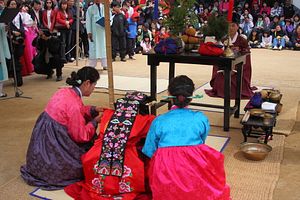Results from a Statistics Korea social survey, conducted last year, show attitudes toward marriage and cohabitation are changing. The data suggests priorities and values are shifting in postindustrial South Korean society.
According to a Dong-a Ilbo report on the data, slightly more than 50 percent of respondents (56.8 percent) agree that “One should get married.” That represents a 10 percentage point drop since 2008 when the number stood at 68.8 percent.
The data shared by Dong-a also shows that most people are okay with international marriages. To the statement, “It is okay to marry a foreigner,” 63.2 percent agreed. More than 70 percent of those in their 20s and 30s thought so (74 percent and 73.1 percent respectively).
Interestingly, 46.6 percent of respondents agree that “a man and woman can live together even if they aren’t married.” Though more than 50 percent of all respondents disagreed (53.4 percent), over half of both the 20s and 30s age cohorts either “completely” or “somewhat” agreed that cohabitation is acceptable (61.4 percent and 62.8 percent, respectively). Given the conservative nature of South Korean society, these findings are significant.
Also covering the report, JTBC notes that only 9 percent of those in their 20s and 30s find it “imperative” to get married; this contrasts sharply with the 60s age cohort (33.7 percent).
Declining interest in South Korea toward marriage is consistent with broader regional trends. An economic slowdown relative to earlier decades and the pressure to compete in a postindustrial labor market have certainly made marriage a less appealing move. Average wedding costs exceeding 50 million won is likely a contributing factor.
“The flight from marriage” is indicative of significant social change in East Asia, argues The Economist. The decline of marriage rates has, in many ways, to do with education and jobs for women. Better educated and career-oriented, women are entering the labor market at a much higher rate than in the past (a key variable of postindustrial societies). Indeed, as The Economist points out, “[i]n South Korea now, women earn half of all master’s degrees.” And while many women still leave their jobs after having children, labor participation for women in their early 20s is well over 60 percent.
The Statistics Korea data also indicates changes in basic values. Strong support for cohabitation is significant, as is a more laissez-faire attitude regarding international marriage. While the former might be more of a practical concern, the latter corroborates the claim that opinions regarding what constitutes the nation are changing.

































